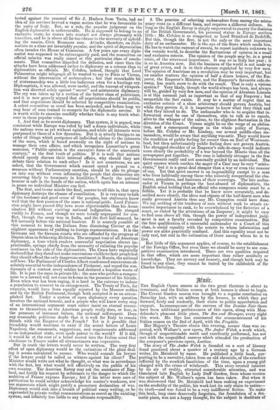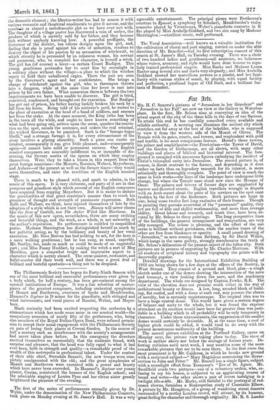Zak.
THE English Opera season at the two great theatres is about to terminate, and the Italian season at both houses is about to begin. The Covent Garden season was brought to a regular conclusion on Saturday last, with an address by the lessees, in which they put forward, fairly and 'modestly, their claim to public approbation and support. In consequence of the success of the Domino Noir there have been additional performances of this opera, along with Men- delssohn's pleasant little piece, The Son and Stranger, every night this week. Mr. Gye has announced the commencement of his Italian season on the 2nd of April, with the Prophae. Her Majesty's Theatre closes this evening, sooner than was ex- pected, with-Wallace's new opera, The Amber Witch, a work which, though of unquestionable merit and excellently performed, has not met with the unqualified success which attended the production of the composer's previous opera, lifeline. The story of The Amber Witch is founded on a sort of literary fraud practised about a quarter of a century ago by a German writer, Dr. Meinhold by name. He published a little book, pur- porting to be a narrative, taken from an old chronicle, of the cruelties inflicted by the monkish fanaticism of the time, upon a young girl charged with the crime of witchcraft. This story created interest by its air of reality, attracted considerable attention, and was translated into English by Lady Duff Gordon, from whose version the subject of Mr. Wallace's opera has been taken. But when it was discovered that Dr. Meinhold had been making an experiment on the credulity of the public, his work lost its only claim to notice— its truth—and was found to be a very indifferent fiction. To make this book, long since deservedly forgotten, the foundation of a dra- matic piece, was not a happy thought, for the subject is destitute of the dramatic element ; the libretto-writer has had to season it with various romantic and theatrical condiments to give it savour, and the result.is as absurd a melodramatic plot as we have ever met with. The daughter of a village pastor has discovered a vein of amber, the produce of which is secretly sold by her father, and they become rich without anybody knowing how. A powerful profligate, the Governor of the district, has odious designs upon the girl, and, finding that she is proof against his arts of seduction, resolves to destroy the object of his passion by an accusation of witchcraft, to which atrocity he is persuaded by an infamous woman, his servant and paramour, who, to complete her character, is herself a witch. The girl has (of course) a lover—a certain Count Rudiger: This young gentleman persuades her to meet him by moonlight in a solitary place without the village—a place to winch the witches repair to hold their unhallowed orgies. There the pair are seen by the Governor's agent and her confederates. She brings a charge of witchcraft against the girl, who is thereupon thrown into a dungeon, while at the same time her lover is cast into prison by his own father. What connexion there is between the two imprisonments we have been unable to discover.. The girl is tried, convicted, condemned, and brought out for execution. But Rndiger has got out of prison, his father having luckily broken his neck by a fall from his horse. Being told of his mistress's peril, he rashes to the place of execution at the head of a band of soldiers, and rescues her from the stake. At the same moment, the King (who has been in the town all the while, and ought to have known something of what had been going on), arrives upon the scene, quashes the convic- tion on the spot, annuls the sentence, and orders the real criminal, the wicked Governor, to be punished. Such is the "farrago hujus libelli," and a strange farrago it is, for every circumstance of the story involves a glaring absurdity. Such a piece can excite no interest, consequently it can give little pleasure, and—consequently again—it cannot have solid or permanent success. Our English musical composers are miserably indifferent to, or incapable of dis- cerning, the literary merits of the operas on which they employ themselves. Were they to take a lesson in this respect from the great foreign musicians—the liozarts, Rossinis, Webers, Meyerbeers, and Aubers—of the present as well as the former times—they would serve themselves, and raise the condition of the English musical stage. There is much to be pleased with, and much to admire, in the music of this opera. It is very elaborate, and parts of it are in that pompous and grandiose style which several of our English composers have acquired from copying Meyerbeer. But it is easier to imitate the peculiarities of that great musician's manner than to reach his grandeur of thought and strength of passionate expression. Both Balfe and Wallace, we think, have injured themselves of late by the adoption of a style which is not their own. Bianca will never charm like the Bose of Castille, nor The Amber Witch like Araritana. In the music of this new opera, nevertheless, there are many striking and beautiful things, and the work, as a whole, is not unworthy of the author's reputation. Its performance is entitled to unqualified praise. Madame Sherrington has distinguished herself as much by her pathetic acting, as by the brilliancy and beauty of her vocal execution. Mr. Sims Reeves has had nothing to act, for the hero is a mere walking gentleman; but he has sung, as usual, superbly. Mr. Santley, too, made as much as could be made of an ungrateful part; and Miss Fanny Huddart, by making the witch a sort of Meg Merrilies, gave a somewhat tragic and impressive aspect to a character which is merely absurd. The scene-painter, costumier, and ballet-master did their work well, and there was a great deal of brilliant and tasteful spectacle—a thing not to be despised.































 Previous page
Previous page